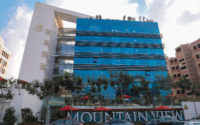Al Gore Delivers Key Note Address On Second Day Of Sixth Global Education & Skills Forum
“Must we change, can we change, will we change?” These were the three questions posed by former United States Vice President and leading environmentalist Al Gore on the second day of the sixth Global Education & Skills Forum (GESF 2018), which took place at The Atlantis Dubai on March 18.
The prominent author and activist, whose work on climate change earned him a joint Nobel Peace Prize in 2007, was delivering a key note address at the end of the second plenary session at the event, which celebrates education and raises awareness of its importance for the global community.
Revealing how it was education that first got him interested in environmental issues, Gore – who was Bill Clinton’s running mate in their successful electoral campaign in 1992 and who was re-elected with him in 1996 – highlighted the role in his formative year of Roger Revelle, leading scientist and scholar who was among the first to study anthropogenic global warming.
“I have devoted my life to the issue of solving the climate crisis because of a great teacher. Back in the 1960s when I was a college student, I walked into the classroom of a great professor who was teaching a course outside of my field of concentration. He was one of the greatest climate scientists of all time. I didn’t really understand that at the time. His name was Roger Revelle and he was the first scientist who devised a method for measuring CO2 in the earth’s atmosphere,” said Gore.
Drawing attention to man’s activities on the environment, Gore’s presentation slides included one of the first photos of the earth from the moon, which was taken before the manned Apollo landing. He explained that the iconic image had been responsible for changing the way humanity perceived the earth.
“Within 18 months of this picture the first Earth day had been organised and major environmental laws had been passed in many countries. The true nature of our atmosphere is critically important to an understanding of why the climate crisis is so dire. Because the power of our civilisation has grown so incredibly with 7.8 billion people – its tripled in my lifetime – and the technologies that are available to us now are so incredibly powerful,” he continued.







